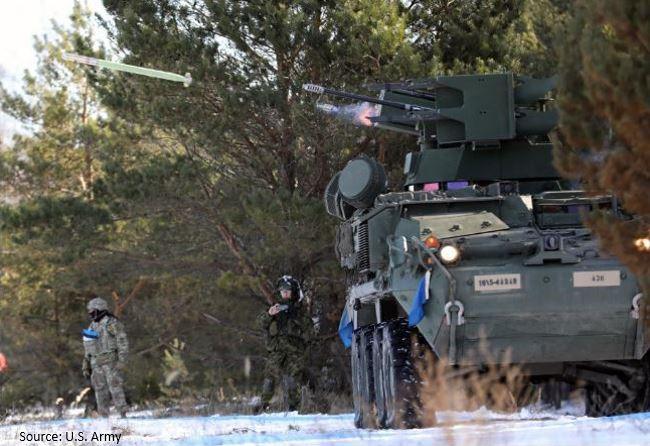
Italian flagship aerospace and defense company Leonardo is buying Rada Electronic Industries, a publicly traded Israeli defense electronics and military radar specialist, to fold under Leonardo’s U.S.-based DRS brand, the companies announced June 21.
The all-stock deal, expected to close in the fourth quarter, aims to beef up the Italian company’s exposure to growth segments inside the world’s largest defense market, i.e., defense electronics, counter-UAV, force protection and missile-related radars for the U.S. military. The deal also makes DRS a publicly traded company itself, a sought-after option to monetize the wholly owned U.S. subsidiary that Leonardo leaders openly mulled for years along with other proposals.
Former U.S. Deputy Defense Secretary William Lynn III, now CEO of Leonardo DRS, further said the Rada acquisition could be the first of a series of takeovers or outside investments that will help DRS grow inorganically and provide shareholders with dividends from the acquired revenue streams.
Rada CEO Dov Sella asserted the deal’s significance is a milestone for Israeli defense offerings. “The transaction represents the first time a major U.S.-based defense company—backed by a global defense prime—has acquired a significant Israeli defense technology company,” he said. “This unique transaction will strengthen the Israeli defense industry and set trends and direction for the future.”
According to the terms, Leonardo DRS will acquire all shares of Rada in exchange for a roughly 19.5% stake for Rada shareholders in the combined company, which will keep the name Leonardo DRS and should be traded on the Nasdaq stock exchange and the Tel Aviv Stock Exchange under the ticker “DRS.” The deal was designed to offer Rada shareholders a 20% premium to their pre-announcement share price.
Assuming the tax-free deal closes—the deadline is June 30, 2023, according to a U.S. regulatory filing—Rada and its U.S. subsidiaries will be a wholly owned subsidiary of DRS, operating as a business unit under the latter’s Advanced Sensing and Computing segment. The acquisition requires Rada shareholder approval, as well as from Israeli officials.
The combined company ostensibly had $2.7 billion of revenue and $305 million of adjusted earnings before interest, taxes, depreciation and amortization (Ebitda) earnings in 2021. In the first quarter of 2022, it had pro-forma net financial debt of around $197 million, with a ratio of net financial debt to last-12-months adjusted Ebitda earnings of 0.6x. On its own, Rada ended the first quarter with net cash and equivalents of $66 million and no debt.
In May, Jefferies analysts said Rada could grow at a 19% organic compound annual growth rate over the next three years compared with peers who were likely stuck around 5%. “Europe offers further expansion potential given increased interest around c-UAS and point defense systems following the Russia-Ukraine crisis,” they said.
“Over the longer term, we are targeting mid-teens margins and low double-digit earnings growth,” DRS Chief Financial Officer Mike Dippold told a teleconference. He did not offer detailed numbers.
Executives said the deal took root after Rada started evaluating strategic alternatives. It has been a familiar partner for DRS. For instance, Rada provides DRS with the radar system on the Maneuver-Short Range Air Defense (M-SHORAD) for the U.S. Army.
Managers did not address further why Rada was evaluating alternatives, but several Israeli companies have gone through changes in recent years. Some of are related to a limited market potential in serving only Israeli national security customers. At the same time, the historically close alignment of Israel and the U.S. has provided an outlet for growth. Elbit Systems, for example, has been acquiring U.S. businesses and growing its American market position.
“The Leonardo DRS-Rada deal creates a stronger, more visible mid-tier U.S./global defense electronics firm,” Capital Alpha Partners analyst Byron Callan says. “We don’t see this as a catalyst for immediate strategic follow-on moves in the defense sector, but it’s another event that’s part of an underlying trend.”
The resulting merger will create a larger listed military contractor, he notes, and it is the latest example of a stronger, platform-agnostic defense electronics provider with multinational access.
For Leonardo, the Rada acquisition and go-public event provides long-sought payback on its DRS takeover. In early 2021, Leonardo shelved a plan for DRS to go public on its own after several years of on-again, off-again interest in selling DRS, as numerous management teams at Leonardo and its predecessors came and went. In 2008, then-Finmeccanica bought DRS Technologies for $5.2 billion. The acquisition was a relatively early example of a post-9/11 trend of state-backed foreign defense primes buying U.S. defense businesses.
